- Homepage
- >
- women in engineering
- >
- What It Means to Be a Woman In STEM; Celebrating International Women in Engineering Day
What It Means to Be a Woman In STEM; Celebrating International Women in Engineering Day
June 24, 2024 | Jordan Baker, Center for Clean Energy Engineering
What does it mean to be a woman in STEM? In honor of International Women in Engineering Day, the Center for Clean Energy Engineering (C2E2) met with some of our graduate students to answer this question. While talking with the students, we learned more about their journeys into STEM and the challenges they have had to overcome in pursuit of their degrees.
International Women in Engineering Day was created back in 2014 by the Women’s Engineering Society, a charity created in 1919. This charity was founded to support women entering the industry at the end of the First World War, after many women took on jobs and wanted to stay in them. Now they work to promote and bring more representation of women to the engineering field. This day, which originated in the UK and has now expanded globally, serves as a representation of this mission of promoting women engineers and how they are changing the world, one degree at a time.
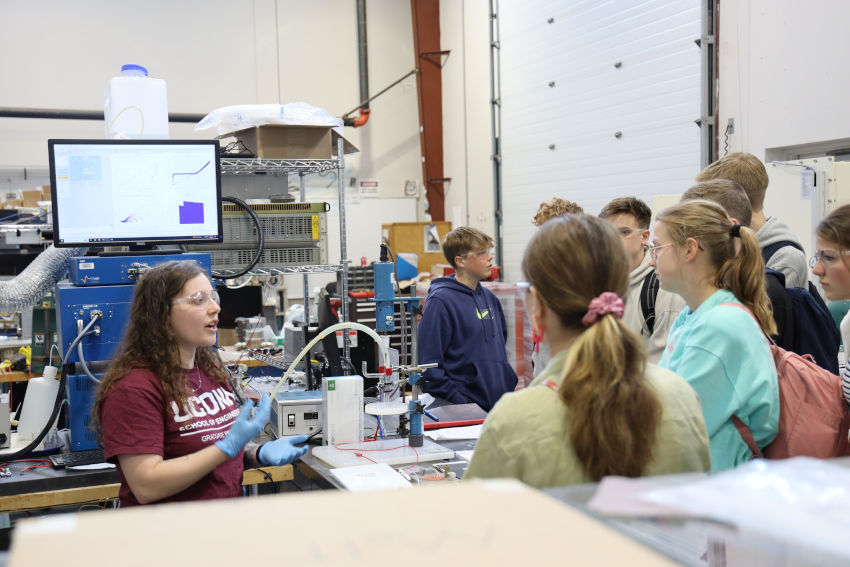 Alanna Gado talking with visitors in the lab at C2E2. (Terry Barber- Tournaud/UConn photo)
Alanna Gado talking with visitors in the lab at C2E2. (Terry Barber- Tournaud/UConn photo)
At C2E2, we are fortunate to have many female engineers who continuously work to bring their ideas and goals to life in pursuit of their degrees. We met with some of our students to get an understanding of their journey into STEM and to learn more about what it means to be a woman in STEM, particularly in engineering.
Many of the students we talked to expressed similar sentiments surrounding challenging themselves and exploring the problem-solving aspect of engineering. But for some students, they had different experiences with joining STEM. Mariah Batool, a graduate student with Prof. Jasna Jankovic’s group, had a different experience. “In the country where I come from, parents normally give their kids just two options − to be an engineer or a doctor. So, at that point I thought it was a sensible choice, but later I developed interest when I got into it and learned more about what my career could be like.”
While some of the students we talked to had similar experiences or felt the familial pressure to go into STEM, they still expressed their love and passion for their studies and that, if certain factors were different, they still would have chosen the same.
While learning more about what motivated our students to choose STEM, we wanted to learn more about who inspired them in their pursuit. One student, Elena Ford, a graduate student with Dr. Naba Karan, said that her inspiration came from her grandfather. “The reason I got into engineering was because my grandpa is an engineer. He was never able to finish his engineering degree, but he got very far. He ended up going into business but later, he went back into STEM and started his own calibration lab in Connecticut. This is what got me interested in STEM and what encouraged me to stay.”
Family was one of the biggest factors that affected and inspired our students to study STEM and to stick with it. Many, like Ford, had families who encouraged them and supported them to pursue STEM. But some were also inspired by public figures and other influential individuals in STEM and that affected their views and pursuit of the field.
Pursuing your goals and what you are passionate about can be hard at times. Especially when there are factors and challenges that make it harder to achieve them. We wanted to learn more about what motivates our female students to keep working to achieve their goals. Many of them expressed their motivation that comes from their research. Ravel Larose, a research assistant with Prof. Jankovic’s group, shared that her motivation comes from her passion for research. “I’m motivated by the ongoing climate crisis. Every day I can step outside and see the effects of the changing climate around me, and it reinforces my determination to help make a difference, in whatever small way that I can.”
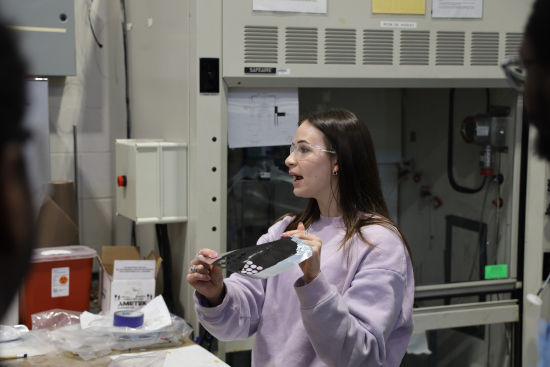 Elena Ford talking about Coin Cells in the lab at C2E2. (Jordan Baker/UConn photo)
Elena Ford talking about Coin Cells in the lab at C2E2. (Jordan Baker/UConn photo)
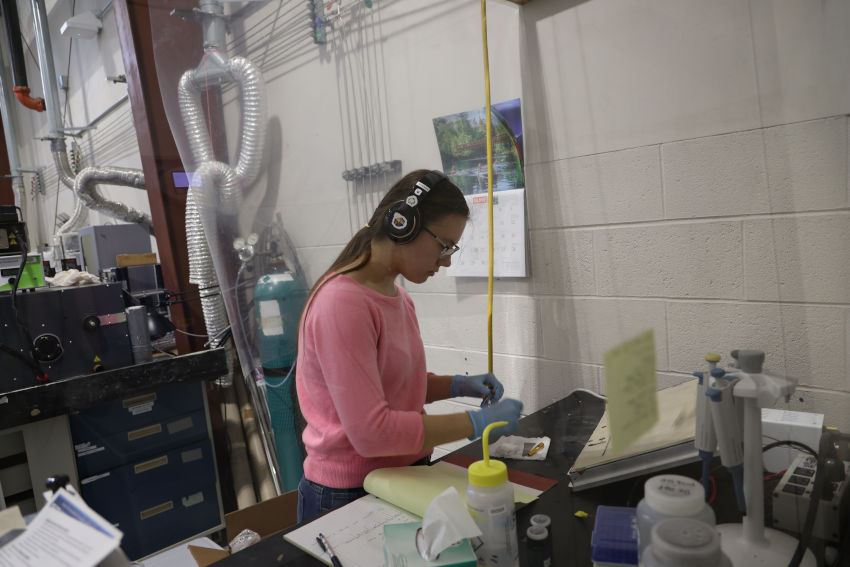 Ravel Larose working in the lab at C2E2. (Terry Barber-Tournaud/UConn photo)
Ravel Larose working in the lab at C2E2. (Terry Barber-Tournaud/UConn photo)
Many of our students are motivated by their love of research and learning new things. Sara Pedram, a graduate student also in Prof. Jankovic’s group, said “It’s like a discovery for me. As you learn and know more, you’re getting more interested. Whatever I do, it’s kind of opening more challenges and more questions that I’m looking to answer.”
The fact that there is always more to be learning and exploring is a strong motivator for our students. Especially when there are many challenges that can arise when pursuing any goal or passion. There are so many positives surrounding women in STEM but there are some negatives. Many of our students have experienced or noticed the challenges that women in STEM face.
There can be a lot of challenges simply surrounding being a woman in STEM, which is what our students noted. “I feel like all women in STEM, we all feel like no one ever really takes us seriously. If we run an experiment, we’ll have to do the experiment over and over for people to actually believe your results.” said Ford. “There are certain standards in academia and being a woman in academia feels like you have to fulfill every single one of those standards and expectations to even be recognized or get your work published.”
There are a lot of expectations that are placed on women within STEM that are not always placed on men so it can feel challenging at times. Naomi Adler, a graduate student with Prof. Leslie Shor’s group, touched on this aspect a lot. “They notice if you are not there, the professor will notice. If you’re not there, any of the other guys, may or may not be noticed. You will stand out. For better or for worse you stand out.”
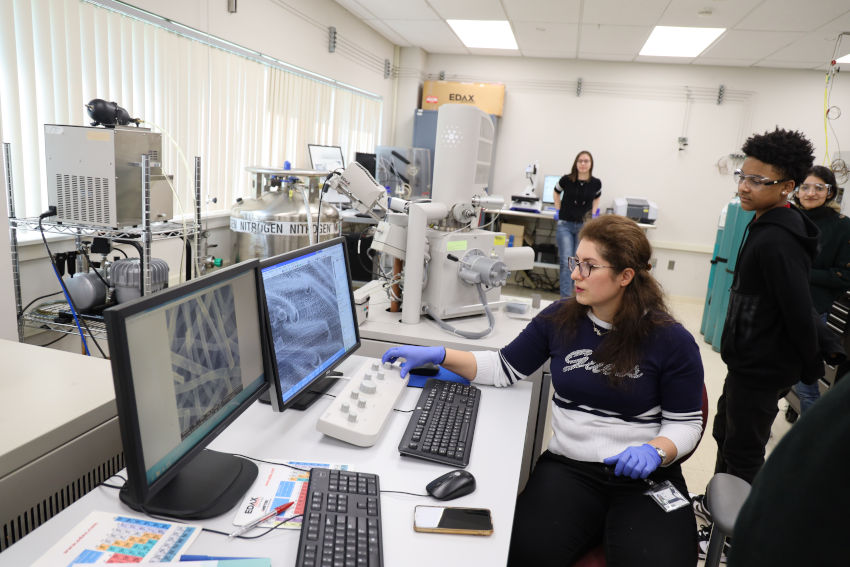 Sara Pedram talking about the SEM with visitors at the C2E2 lab. (Terry Barber-Tournaud/UConn photo)
Sara Pedram talking about the SEM with visitors at the C2E2 lab. (Terry Barber-Tournaud/UConn photo)
She touches on the disparity between women and men within the engineering field and the numbers that reflect them. The female population within engineering, even at UConn, is drastically smaller than the population of men within the major. She has felt the impact of this throughout her education, saying, “I’ve had people tell me that the only reason I got into UConn as an engineer is because I am a girl. That I didn’t earn my place but got here because they needed a woman. And that is something that has always rubbed me wrong, the whole diversity of affirmative action. It is a challenge because you can be qualified or even overqualified and they will still view you as undeserving and that you are only here because you are a woman. You have to work twice as hard to be given half as much credit.”
There is so much extra work that can go into STEM when you are a woman, and it can be hard to prove yourself at times. But there are so many other obstacles that can affect one's journey. While talking about the issues that many of our students have faced, two pointed out the challenges that arose when they had children. Batool, a mother of two, shared, “All those roles that we take as a woman, sometimes it’s really hard to balance personal life and your career. I think being a mother means that you are attached to your kids, and it comes naturally but when you are too focused on your career, you feel that guilt of not being there for your kids.” There are a lot of societal expectations placed on women, especially surrounding careers and motherhood and it can be hard to find that balance, causing more challenges to surface for women pursuing their degrees and goals.
But despite these challenges, our students are still pursuing their goals and education and they are not letting it deter them. While talking with Adler, she pointed out one of the things that has kept her motivated throughout her education, her advisor Prof. Shor.
“When I started my undergrad here, she was the first and only female faculty member in Chemical Engineering. Now she is going to be the Dean of the Graduate School and seeing her transform from being the only female faculty member in the department, to one of the many, and now advance to this leadership role, has been inspiring.”
Many of the students felt similarly about their female advisors and professors here at UConn and throughout their education. They have served as a source of inspiration in pursuing their goals. “All of the female professors I have had in the Chemical and Biomolecular Engineering Department have inspired me.” Gado said when asked who has inspired her to stick with STEM. Despite any challenges that arise, it is important to have these role models and other women in these settings because representation matters. As well as having supportive advisors, who will embrace family-career balance for their students, will encourage more women to pursue STEM and engineering.
These challenges should not deter anyone from entering a field that they're passionate about. It is important to not only pursue what interests you and what you enjoy, but to also work to instill change. While we have made a lot of progress with more women joining STEM, there is still a gap in the numbers, and there is still work that needs to be done to further prove that women are capable and belong in STEM.
We asked our students what they would say to younger girls who may be hesitant about pursuing this education/career path and they all gave similar advice. STEM is a field for everyone, regardless of differences, anyone can pursue STEM.
“The world needs you, in whatever you end up doing. If STEM speaks to you, follow it with everything you have. Never doubt that you have the capacity or worry about what others will think of you.” said Larose.
“Don't be afraid to express yourself − that’s something I’m still working on. Don’t be afraid of people judging you, you are capable of what you are doing.” Pedram also added.
You should never be afraid to step into something you are passionate about or that you love, but even if you are, you shouldn’t shy away from it. “Give it a try. If you don’t think you can do it, do it." Ford said.
We wanted to know what it means to be a women engineer and a female in STEM. We wanted to explore what it means to face challenges and to work through different struggles that attempt to pull you down and hold you back, but still find a passion for what you’re doing and continuing to stick it out. We asked our students this question, “What does it mean to be a woman in STEM?” and their answers were both inspiring and interesting.
“Everyone is going to be more critical of you as a woman in STEM – even lay people, even people very close to you. Being a woman means being scrutinized, and being a woman in STEM magnifies that. At the same time, that gives you a chance to show the world that their assumptions are wrong. Women are just as smart, just as hard-working, just as capable.” Larose said. “In the end, I think that the time we spend on criticizing and discouraging woman in these fields is time that’s running out. If the scientific community is going to overcome the biggest issues facing the world, it needs everyone – including women – to be working together.”
Gado furthered this idea, saying, “Being a woman in STEM means adapting to growth-limiting environments and focusing on the bigger picture. STEM fields have traditionally been male dominated and leveling this out to be more inclusive of men and women, and people of diverse backgrounds, will progress science and technology.”
“It means you have to be very strong, mentally and physically. You have to deal with critiques and behavioral critiques that can dig at your personality, but you have to be strong and have a strong will to overcome that.” Ford offered.
It’s powerful and fulfilling to be a woman in STEM, especially when you know that you are doing what you are passionate about and contributing to the betterment of society. Despite all the problems and challenges, it is a powerful notion to know that you can do it. Pedram touched on this idea, saying, “It’s not a fair world but we are much more capable than what we may think. I’m proud of myself for getting to where I am.”
To be a woman in STEM is powerful and it means that you are stronger than you or anyone else may think. “You're a fighter, a trailblazer, willing to go down a not so easy path, you are willing to fight a little to get there. Don’t be afraid to be a woman in STEM. Powerful and strong women have gone through this and so can anyone else.” Adler said. “Find a champion, someone you can go to who will support you and let you know that you are not alone, and you don’t need to suffer. You don’t need to do it alone.”
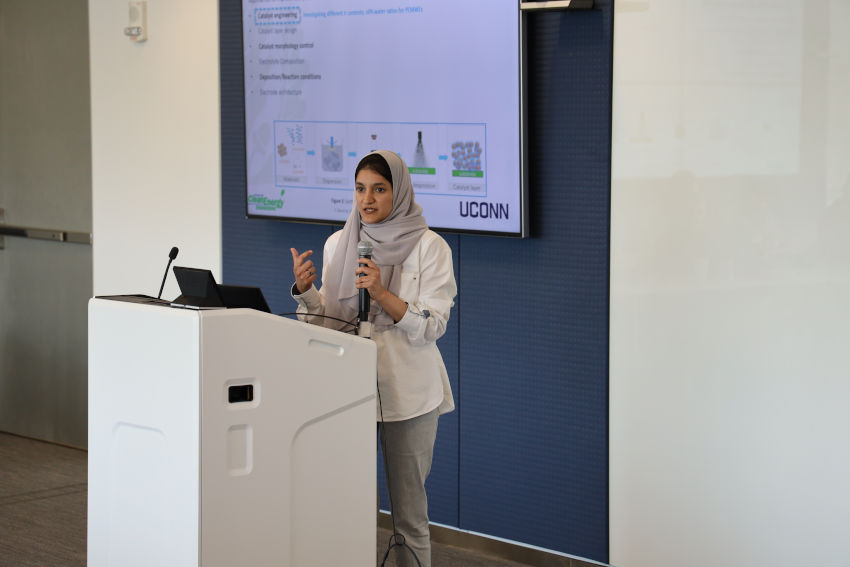 Mariah Batool presenting her research at the OREO Conference. (UConn photo)
Mariah Batool presenting her research at the OREO Conference. (UConn photo)
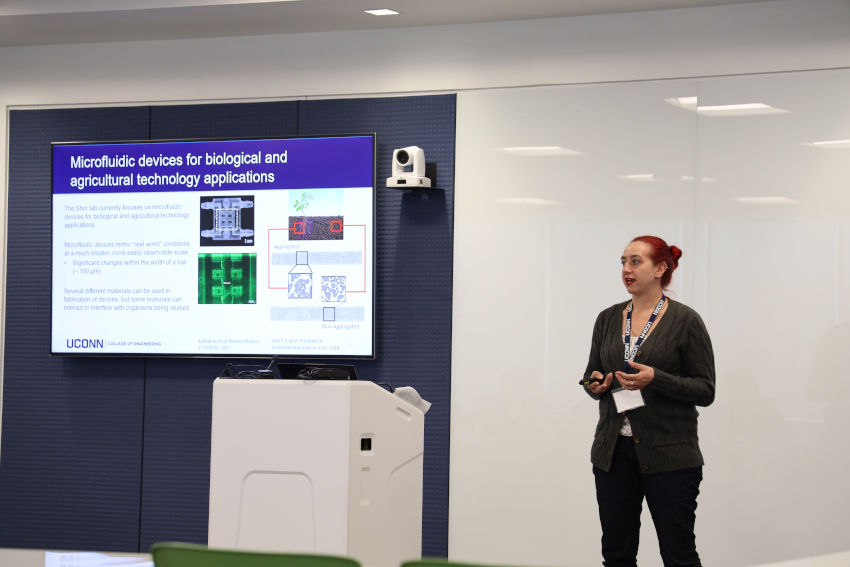 Naomi Adler presenting her research at the C2E2 GA Research Summit. (Jordan Baker/UConn photo)
Naomi Adler presenting her research at the C2E2 GA Research Summit. (Jordan Baker/UConn photo)

